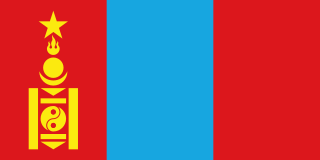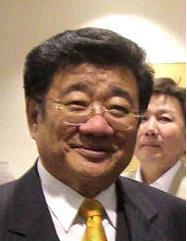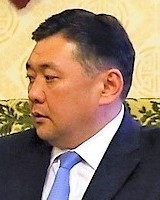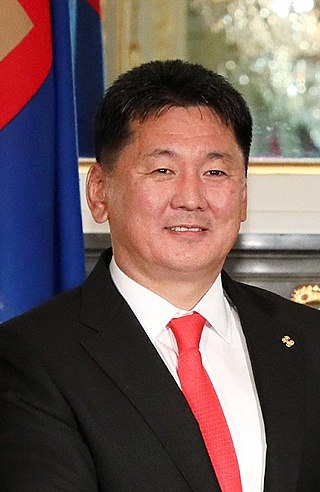
The politics of Mongolia takes place in a framework of a semi-presidential multi-party representative democracy. Executive power is exercised by the prime minister, who is the head of government, and the Cabinet. The president is the head of state, but holds limited authority over the executive branch of the government, unlike full presidential republics like the United States. Legislative power is vested in parliament. The judiciary is independent of the executive and the legislature.

The Mongolian People's Republic was a socialist state which existed from 1924 to 1992, located in the historical region of Outer Mongolia in East Asia. Until 1990, it was a one-party state ruled by the Mongolian People's Revolutionary Party, and maintained close political and economic ties with the Soviet Union, as part of the Eastern Bloc.

Nambaryn Enkhbayar is a Mongolian politician. He served as the Prime Minister of Mongolia from 2000 to 2004, as Chairman of the State Great Khural from 2004 to 2005, and as President of Mongolia from 2005 to 2009. He is the first person to have held all of the top three positions in the Mongolian government. He was the chairman of the Mongolian People’s Party from 1997 to 2005 and head of Mongolian People's Revolutionary Party from 2010 to 2021. His eldest son, Batshugar Enkhbayar is a member of the State Great Khural from Mongolian People's Party.

The modern democratic era of Mongolia started after the Mongolian Revolution of 1990.

The Mongolian People's Party (MPP) is a social democratic political party in Mongolia. It was founded as a communist party in 1920 by Mongolian revolutionaries and is the oldest political party in Mongolia. The party played an important role in the Mongolian Revolution of 1921, which was inspired by the Bolsheviks' October Revolution. Following independence, it governed Mongolia as a one-party socialist state. The party changed its name to the Mongolian People's Revolutionary Party (MPRP) and joined the Communist International in 1924 and served as a sole-ruling party of the Mongolian People's Republic.

Punsalmaagiin Ochirbat is a Mongolian political figure and a current member of the Constitutional Court of Mongolia. He served as a president of Mongolia from 1990 to 1997 first as Chairman of the Presidium of the People's Great Khural in 1990 then, as the President of the Mongolia from 1990 to 1997, he is the first President of Mongolia to be elected by direct popular vote.

Mongolia elects its head of state—the President of Mongolia—at the national level. The president is elected for a six-year term by the people, using the Two-round system. The State Great Khural has 76 members, originally elected for a four-year term from single-seat constituencies. Due to the voting system, Mongolia experienced extreme shifts in the composition of the parliament after the 1996, 2000, and 2004 elections, so it has changed to a more proportional system in which some seats are filled on the basis of votes for local candidates, and some on the basis of nationwide party preference totals. Beginning in 2008, local candidates were elected from 26 electoral districts. Beginning with the 2012 elections, a parallel system was enacted, combining a district part and a nationwide proportional part. 48 seats are chosen at the local level in 26 districts with 1-3 seats using Plurality-at-large voting. 28 seats are chosen from nationwide closed party lists using the Largest remainder method. In the district seats, a candidate is required to get at least 28% of the vote cast in a district to be elected. If there are seats that are not filled due to this threshold, a runoff election is held in the respective district with twice the number of representatives as there are seats to be filled, between the top vote-getters of the first round.
Mendsaikhany Enkhsaikhan was the prime minister of Mongolia from July 7, 1996 to April 23, 1998, the first in 80 years not belonging to the Mongolian People's Revolutionary Party.

The State Great Khural is the unicameral parliament of Mongolia. It is located in the Government Palace.

Miyegombyn Enkhbold is a Mongolian politician who was Prime Minister of Mongolia from January 2006 to November 2007 and Deputy Prime Minister from 2007 to 2012. He has been Chairman of the State Great Khural, the Mongolian parliament,from 2016 to 2019.
Janlavyn Narantsatsralt was a Mongolian politician. He served as Prime Minister of Mongolia from December 9, 1998 to July 22, 1999.

Sanjaagiin Bayar is a Mongolian politician who was General Secretary of the Mongolian People's Party from 22 November 2007 to 8 April 2010, and Prime Minister of Mongolia from 22 November 2007 to 29 October 2009. He announced on 26 October 2009, that he was going to resign his position as Prime Minister due to health reasons. He was replaced by Sükhbaataryn Batbold on 29 October 2009.

Parliamentary elections were held in Mongolia on 29 June 2008. A total of 356 candidates ran for the 76 seats in the State Great Khural. According to official results published on 14 July, at least 39 seats were won by the ruling Mongolian People's Revolutionary Party (MPRP), and at least 25 seats by the main opposition party, the Democrats (DP). Ten seats remained subject to possible recounts.

Parliamentary elections were held in Mongolia in 1990. The State Great Khural was elected on 22 June 1990, with a second round on 29 June, at which time the Little Khural, the new second chamber, was also elected.

The Mongolian Revolution of 1990, known in Mongolia as the 1990 Democratic Revolution, was a peaceful democratic revolution which led to the country's transition to a multi-party system. It was inspired by the economic reforms of the Soviet Union in the late 1980s and was one of the many revolutions of 1989. It was led mostly by young demonstrators who rallied at Sükhbaatar Square, in the capital city Ulaanbaatar. The main organisers of the demonstrations included Sanjaasürengiin Zorig, Erdeniin Bat-Üül, Davaadorjiin Ganbold, Tsakhiagiin Elbegdorj, Bat-Erdeniin Batbayar.

Presidential elections were held in Mongolia on 24 May 2009. They were contested between incumbent Nambaryn Enkhbayar, supported by the Mongolian People's Revolutionary Party, and Tsakhiagiin Elbegdorj, who had support of the Democratic Party and the opposition parties. Elbegdorj declared himself the victor before the count was official but based on his party's counts. Enkhbayar admitted a narrow defeat shortly after and said that he would respect the results, marking the second time an incumbent president had lost their bid for re-election - following Punsalmaagiin Ochirbat in the 1997 election.
Büdragchaagiin Dash-Yondon is a Mongolian politician and teacher of history and philosophy. He was the leader of the Mongolian People's Revolutionary Party from 1991 to 1996, as its Chairman from 1991 to 1992 then as Secretary General from 1992 to 1996.

Parliamentary elections were held in Mongolia on 28 June 2012 to elect 76 members of the State Great Khural. Also held during the parliamentary elections was the Ulaanbaatar city council election, the first time both have been held at the same time. For the first time, the election used vote counting machines by new parliamentary election laws to make the election fair.

The Mongolian People's Revolutionary Party was a political party in Mongolia which was founded in 2010 by Nambaryn Enkhbayar. The party received approval to use the Mongolian People's Party's old name by the Supreme Court of Mongolia. Enkhbayar, former chairman of the original MPRP and a former President of Mongolia, was the party's leader. It merged back into the Mongolian People's Party in 2021.

Ukhnaagiin Khürelsükh, also referred to as Khürelsükh Ukhnaa, is the 6th and current president of Mongolia, beginning his term on 25 June 2021 after winning the 2021 Mongolian presidential election. He was prime minister from October 2017 to January 2021 and was elected to the Parliament of Mongolia four times – in 2000, 2004, 2012 and 2020.

















